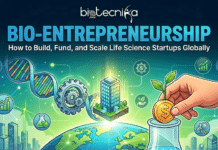Top Skills You Need for a Global Career in Biotechnology in 2026
Just imagine you walk into a modern lab in Singapore, and instead of the loud, chaotic spaces you see in movies, the room is almost calm. A few machines whir softly as they watch over tiny clusters of living cells that will eventually become real medical treatments. Now shift the scene to Germany, where automated systems handle an entire production line, and teams of engineers oversee vaccine batches with the precision of watchmakers. These are not distant possibilities. This is where biotechnology is heading in 2026.
The field no longer fits neatly into the old idea of white coats and test tubes. All over the world, scientists are rewriting DNA with CRISPR tools, running experiments that rely on artificial intelligence, and using cloud platforms to make sense of enormous pools of biological data.
Maybe you imagine yourself helping design the next cell therapy in Boston, or working on sustainable bioprocessing in Shanghai, or even dealing with global biotech ethics in Nairobi. Whatever direction you choose, the industry is expanding in every corner of the world.
And with that expansion comes a shift in what employers look for. It’s no longer enough to be good at lab techniques; companies want people who understand data, who can work with teams from different cultures, and who can adapt quickly when technology changes. If you’re aiming for a career that crosses borders, you’ll need a toolbox that’s much broader than traditional science training.
So what exactly should you be focusing on? Which skills will truly matter for a global biotechnology career in 2026? Let’s break it down.
Current Trends Shaping Biotechnology Skills 2026 Worldwide
To gain the right skills, you first have to understand the trends of the biotech industry. To help stand out from the crowd and gain biotechnology skills, here is a list of some current trends in biotechnology.
-
Rapid Market Growth
The global biotech market is growing, and the experts are expecting it to grow up to 13% in the coming years. All thanks to the latest innovations and technologies.
-
Expansion of Advanced Therapies
With the advancing technologies, we have Advanced Therapeutic Medicinal Products (ATMPs). These include cell therapies, gene therapies, and antibody drug conjugates (ADCs), which are one of the main reasons for biotech growth.
-
Automation and Biomanufacturing Efficiency
With the automation, the bioprocessing is changing. The latest Biomanufacturing Trends Report shows that outsourcing of cell and gene therapy production continues to increase.
-
Digitalisation & AI Integration
AI, cloud computing, and bioinformatics are booming. This has accelerated drug discovery, optimized labs, and analyzed biological data more precisely. These cloud platforms make the process easy for the smaller labs. They help them get high-performance computational results.
These trends have a strong impact on what essential biotech skills will be valuable in 2026. They will guide your global biotech career.
Essential Biotechnology Skills You Need for International Roles in 2026
To build a promising biotech career in 2026, you need both technical skills and soft skills. Below are the key areas you must focus on:
Technical Biotechnology Skills
-
Advanced Laboratory Techniques
- Gene Editing & CRISPR: Today, our scientists are using advanced tools like RISPR-Cas systems, base editing, and other related gene editing tools to solve the mysteries of biotech. These tools are laying the foundation for the next generation of therapies.
- Cell Culture & Cell Therapy: Mammalian cell culture, stem cells, CAR-T, and other cell-based therapies are used by researchers in the lab. This therapy is scaling up Advanced Therapy Medicinal Products (ATMPs).
-
Bioinformatics & Multi-Omics Integration
- Today, biotech labs generate huge amounts of data, from genomes and gene expression to proteins and metabolites. This means if you are able to combine and analyze multi-omics data, then you can become one of the most valuable people in the field.
- When you enter the world of biotechnology, you should be comfortable working with bioinformatics tools and pipelines. These include basic biotechnology skills like running sequence alignments, checking for genetic variants, and interpreting functional annotations. Do you know that many labs now use cloud platforms, so knowing how to work with cloud-based analysis tools can be a big advantage to you.
- As biotech research becomes more global, it’s also important to understand data standards and good documentation practices. Making your data clear, reproducible, and easy to share helps teams across different countries and labs work together smoothly.
-
Regulatory and Quality Knowledge
- Understanding GMP is important in cell and gene therapy. It makes sure the products are made safely by following proper steps in production, using clean systems, and maintaining high-quality checks.
- Knowing global regulations like the FDA and EMA guidelines also helps. If you want an international biotech career, companies value people who can manage documentation, follow rules, and support inspections across different countries.
- Understanding GMP is important in cell and gene therapy. It makes sure the products are made safely by following proper steps in production, using clean systems, and maintaining high-quality checks.
-
Process Development & Biomanufacturing
- Biotech companies are focusing on cutting biomanufacturing costs, so skills like process optimization, scale-up, and continuous bioprocessing are becoming very important. These biotechnology skills will help you stand out from the rest.
- Knowing how to work with automation tools, robotics, and digital twins (virtual models of bioprocesses) also makes you more efficient and industry-ready.
- Biotech companies are focusing on cutting biomanufacturing costs, so skills like process optimization, scale-up, and continuous bioprocessing are becoming very important. These biotechnology skills will help you stand out from the rest.
Soft Skills
| Soft Skill | What It Means / Why It Matters |
| Strong Communication |
|
| Project Management |
|
| Cross-Team Collaboration & Cultural Intelligence |
|
| Creative Problem-Solving |
|
Emerging Skills in Life Sciences for 2026
Along with the basic skills, new and fast-growing areas in life sciences are becoming important in 2026. Learning these emerging skills will help you stay ahead and future-proof your career.
-
AI & Machine Learning for Biotech
- Machine learning is now widely used in biology. From predicting how proteins fold to helping design better CRISPR guides, it has become an important part of biotech research.
- Today, many biotech labs are also becoming “smart labs”. Do you know that robots and automated systems handle complex experiments, run tests, and help interpret results?
- Machine learning is now widely used in biology. From predicting how proteins fold to helping design better CRISPR guides, it has become an important part of biotech research.
-
Cloud-Based Data Platforms
- To build an advanced career, you must have a proficiency in cloud platforms (e.g., AWS, Google Cloud, Microsoft Azure) for storage, compute, and scalable analytics, which is a growing necessity.
- Get yourself familiar with containerization (Docker, Kubernetes) and reproducible computational environments, which help in cross-site collaboration.
- To build an advanced career, you must have a proficiency in cloud platforms (e.g., AWS, Google Cloud, Microsoft Azure) for storage, compute, and scalable analytics, which is a growing necessity.
-
Automation Programming & Digitalisation
- If you love computers, then learning programming skills (e.g., Python, R) for automation, lab instrument control, and data pipeline development can help scale new heights in biotech.
- Learning tools like LIMS, basic automation systems, and digital twin models can help you understand how modern biomanufacturing runs smoothly and efficiently.
- If you love computers, then learning programming skills (e.g., Python, R) for automation, lab instrument control, and data pipeline development can help scale new heights in biotech.
-
Digital Health & Platform Expertise
- Biotechnology and digital health are coming together fast. This means you should understand how modern platforms connect diagnostics, wearable devices, patient data, and treatments in one place.
- Having basic skills in mobile health tools, rules for digital therapies, and how telemedicine works can give you a strong advantage in your biotech career.
- Biotechnology and digital health are coming together fast. This means you should understand how modern platforms connect diagnostics, wearable devices, patient data, and treatments in one place.
-
Adaptability & Lifelong Learning
- Biotech moves fast; what feels new today can become routine tomorrow. To stay ahead, keep learning, gain hands-on experience, and stay open to exploring different areas.
Navigating an International Biotech Job
If you aspire to a global biotech career, technical aptitude alone is not enough. Here’s what helps you land and thrive in international roles:
-
Understanding Global Work Cultures & Ethics
- Biotech companies around the world follow different ways of working.
- Some prefer clear hierarchies, while others use open, collaborative structures.
- Knowing these differences and adapting to them helps you work smoothly with international teams.
-
Language Proficiency & Cross-Cultural Communication
- English is widely used in science, but learning languages like German, Mandarin, or Spanish can give you an edge in major biotech hubs.
- Being able to communicate clearly with people from different backgrounds also reduces confusion and builds trust.
-
Ethical and Regulatory Awareness
- Each country has its own rules for research, data privacy, and product approval.
- Understanding these frameworks makes you a stronger candidate for multinational companies and helps you make responsible decisions in global projects.
Resource for Biotechnology Skills Development
To gain these essential biotechnology skills, we have provided you with a list of strategies that you can follow to excel in your biotech career:
| Category | Key Resources & Strategies |
| Online Courses & Certifications |
|
| Professional Organizations & Conferences |
|
| Literature & Industry Reports |
|
| On-the-Job Learning & Mentorship |
|
Conclusion
A global biotech career in 2026 demands a unique blend of advanced technical knowledge, digital fluency, and cultural agility. With skills like AI programming to regulatory compliance, all these skills will position you at the forefront of biotech innovations.
Along with technical skills, don’t forget to build soft skills such as communication, project management, and adaptability. A right combination of technical skills with strong soft skills will help shine globally.
With the rapid expansion of the biotech industry in 2025, you are at the right place, at the right time. Use digital media smartly, and enroll in relevant courses. Become a member of the international life science community. Be prepared to make meaningful contributions and lead the global biotech community.







